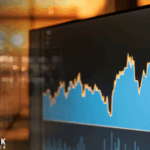Randomness plays a crucial role in cybersecurity, simulations, and statistical modeling, yet reliably generating and verifying it has remained a challenge. JPMorgan Chase, in collaboration with the University of Texas at Austin and national laboratories, has reported the generation of “certified randomness” using a quantum computer. Unlike typical methods using physical sources like lava lamps or dice, this study leverages quantum mechanics to deliver verified unpredictability, marking a shift in how randomness may be produced and authenticated remotely. The development positions JPMorgan Chase in direct competition with large tech firms that have dominated the quantum computing field in recent years.
In earlier developments, companies like Google (NASDAQ:GOOGL) and Microsoft (NASDAQ:MSFT) have made headlines with quantum chip innovations, such as Google’s Willow chip and Microsoft’s Majorana 1. These advancements focused on computational speed and new matter states. JPMorgan’s new achievement, while not aimed at speed, introduces a verified randomness mechanism with implications across multiple sectors. This distinction reflects a broadened scope for quantum computing applications beyond raw processing capability.
How Did JPMorgan’s Quantum Project Work?
The team utilized Quantinuum’s 56-qubit quantum computer to produce outputs that could be verified using classical supercomputers. Quantum bits (qubits) can exist in multiple states simultaneously, and when measured, they collapse to a random value. The process followed a protocol designed by Scott Aaronson, a computer science professor at UT Austin. The generated numbers were not only random but also verifiable, satisfying the condition of “certified randomness” that traditional computers and physical methods could not reliably achieve remotely.
What Makes Certified Randomness Valuable?
Certified randomness is significant for sectors such as cryptography and statistical modeling, where unpredictable yet verifiable data is essential. Traditional methods for generating randomness often lack the ability to validate that randomness over digital networks. Quantum computing opens a new possibility by creating randomness rooted in the inherent indeterminacy of quantum measurement. Although the current process is computationally expensive, the ability to remotely trust random number generation has long-term implications for security and simulation industries.
Researchers involved in the project emphasized the novelty of the outcome.
“It’s the first experimental demonstration of the use of a quantum computer to generate certified random numbers,”
said Scott Aaronson. JPMorgan’s Marco Pistoia highlighted the broader relevance of the discovery beyond quantum hardware.
“This is a significant step for domains like simulation, cryptography, and statistical sampling.”
Despite the achievement, the researchers cautioned against expectations of immediate practical use.
“I don’t expect this to be an application that changes the world,”
Aaronson added, pointing out the high verification costs.
While JPMorgan made its entrance with certified randomness, other major players have focused on different objectives in quantum computing. Google’s Willow chip completed benchmark tasks at speeds vastly surpassing conventional machines. Microsoft’s Majorana 1 chip leveraged a topological state of matter, a relatively uncharted area in physics, to push computational limits. Nvidia, which had expressed earlier skepticism, recently launched a quantum research center, signaling growing recognition of the field’s potential across industries.
The application of quantum computers to generate certified randomness reflects a niche but meaningful use case distinct from the dominant narrative of quantum speed supremacy. For companies reliant on trusted data generation and secure communications, this development could gradually become a vital tool. Still, such advanced techniques require significant computational resources and verification methods that are not yet scalable for everyday use. As quantum hardware evolves, the focus will likely split between solving large-scale computations and enabling functionalities like certified randomness that enhance reliability in digital systems.
Certified randomness opens new possibilities for industries that depend on verifiable unpredictability, such as secure communications, cryptographic key generation, and advanced simulation. For now, the cost and complexity of verifying results limit its immediate adoption. However, as quantum hardware becomes more efficient and verification protocols are optimized, this approach could supplement or eventually replace traditional randomness sources. Organizations seeking stronger security or more robust modeling tools should monitor developments in quantum-certified processes, which may redefine standards in data reliability and trust.









